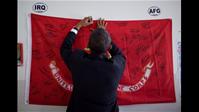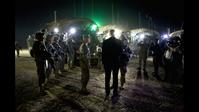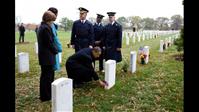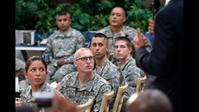A controversial end to a controversial war
Adelina Marini, September 3, 2010
 When the second war in Iraq started (March 2003) many analysts then said that the idea was the US to gain control over the oil richest region of the world in order to satiate its huge consumption of black gold. Whether this was the real and only reason for the incursion in Iraq, it does not make sense to look for an answer any longer. Seven and a half years later the combat actions have been officially ended by the new president Barack Obama.
When the second war in Iraq started (March 2003) many analysts then said that the idea was the US to gain control over the oil richest region of the world in order to satiate its huge consumption of black gold. Whether this was the real and only reason for the incursion in Iraq, it does not make sense to look for an answer any longer. Seven and a half years later the combat actions have been officially ended by the new president Barack Obama.
It is no accident that I have started with oil because Obama's 31st August address to the nation contained something very important, showing a serious rapprochement between the public's interests, both in the US and abroad, to the policies of the White House administration.
Lack of money
In his 18-minute long address President Obama mentioned several times that the main priority of his administration was economic recovery and tackling unemployment. For the seven years of war in Iraq and Afghanistan the budget of the Pentagon has tripled, making the US budget hole grow ominously. "We spent a trillion dollars at war, often financed by borrowing from overseas. This, in turn, has short-changed investments in our own people, and contributed to record deficits. For too long, we have put off tough decisions on everything from our manufacturing base to our energy policy to education reform. As a result, too many middle-class families find themselves working harder for less, while our nation’s long-term competitiveness is put at risk".
This is why the President points out that his most urgent task is economic  recovery, the return to work of millions of Americans, strengthening middle class, provision of better education for children and skills for workers, aimed at making the economy competitive. Doesn't all this sound to you too European? After all, those are the priorities the European Union is following for years, trying to find harmony among its 27 Member States.
recovery, the return to work of millions of Americans, strengthening middle class, provision of better education for children and skills for workers, aimed at making the economy competitive. Doesn't all this sound to you too European? After all, those are the priorities the European Union is following for years, trying to find harmony among its 27 Member States.
What do the US leave behind?
Barack Obama's speech had another focus too - Iraq's responsibility towards its own security. After recalling that from an entirely combat mission the US forces made a transition toward training the Iraqi Security Forces, the President explained: "Of course, violence will not end with our combat mission. Extremists will continue to set off bombs, attack Iraqi civilians and try to spark sectarian strife. But ultimately, these terrorists will fail to achieve their goals. Iraqis are a proud people. They have rejected sectarian war, and they have no interest in endless destruction. They understand that, in the end, only Iraqis can resolve their differences and police their streets. Only Iraqis can build a democracy within their borders. What America can do, and will do, is provide support for the Iraqi people as both a friend and a partner".
 It is good that it has been clearly realised that violence would not end with the US troops leaving the country. The question, however, is the Iraqis' capability to do all this Barack Obama talked about well estimated. Furthermore Iraq is situated in an unstable and sensitive region. A region where Turkey and Iran have started to increase their influence upon. The American President, though, did not mention even a word about these countries in his speech. Instead, he outlined his general plans about ending combat missions in Afghanistan too - a country very much different from Iraq.
It is good that it has been clearly realised that violence would not end with the US troops leaving the country. The question, however, is the Iraqis' capability to do all this Barack Obama talked about well estimated. Furthermore Iraq is situated in an unstable and sensitive region. A region where Turkey and Iran have started to increase their influence upon. The American President, though, did not mention even a word about these countries in his speech. Instead, he outlined his general plans about ending combat missions in Afghanistan too - a country very much different from Iraq.
A recognition of failure
It is obvious that Obama's address was directed internally to the US public, but part of it was directed abroad too: "From this desk, seven and a half years ago, President Bush announced the beginning of military operations in Iraq. Much has changed since that night. A war to disarm a state became a fight against an insurgency. Terrorism and sectarian warfare threatened to tear Iraq apart. Thousands of Americans gave their lives; tens of thousands have been wounded. Our relations abroad were strained. Our unity at home was tested".
No matter this short resume of the consequences of the war, the President did  not afford even for one moment to rebuke or ask for responsibility his predecessor. Furthermore he explained he had talked with him before announcing the decision, recalling that both had differences with regard to the war. Nonetheless Mr Obama hailed the support Mr Bush had for the American troops, his love for the nation and his commitment to national security.
not afford even for one moment to rebuke or ask for responsibility his predecessor. Furthermore he explained he had talked with him before announcing the decision, recalling that both had differences with regard to the war. Nonetheless Mr Obama hailed the support Mr Bush had for the American troops, his love for the nation and his commitment to national security.
The truth is that no words can change the fact that Iraq has been left alone and weak, no matter that 50,000 American troops will remain in the country to assist the Iraqi Security Forces. It is also understandable that the US can no longer endure financially to support such big combat and other missions overseas. It is no accident that Barack Obama reminded of his plans to end the US mission in Afghanistan too. The question is what will happen from now on. And how the international community will get involved in order to fill in the vacuum the US leave in a region, quite proximate to Europe but also neighbouring to Central Asia and Africa. Questions to which Barack Obama did not answer in his address as he should.
Maybe he had to mention that he intended to discuss Iraq's future with his closest partners and allies, to ask again for their help in order to prevent Iraq from turning into a black hole that would suck everything around it.